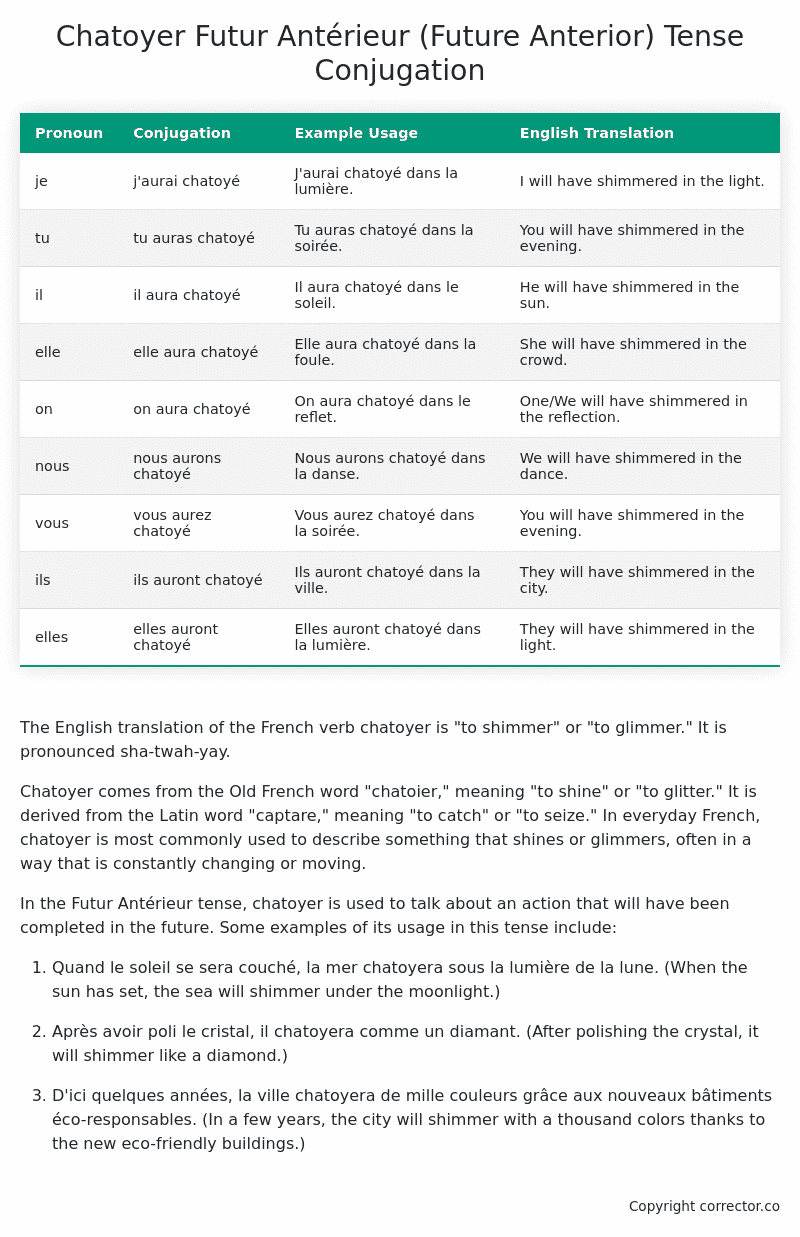Futur Antérieur (Future Anterior) Tense Conjugation of the French Verb chatoyer
Introduction to the verb chatoyer
The English translation of the French verb chatoyer is “to shimmer” or “to glimmer.” It is pronounced sha-twah-yay.
Chatoyer comes from the Old French word “chatoier,” meaning “to shine” or “to glitter.” It is derived from the Latin word “captare,” meaning “to catch” or “to seize.” In everyday French, chatoyer is most commonly used to describe something that shines or glimmers, often in a way that is constantly changing or moving.
In the Futur Antérieur tense, chatoyer is used to talk about an action that will have been completed in the future. Some examples of its usage in this tense include:
-
Quand le soleil se sera couché, la mer chatoyera sous la lumière de la lune. (When the sun has set, the sea will shimmer under the moonlight.)
-
Après avoir poli le cristal, il chatoyera comme un diamant. (After polishing the crystal, it will shimmer like a diamond.)
-
D’ici quelques années, la ville chatoyera de mille couleurs grâce aux nouveaux bâtiments éco-responsables. (In a few years, the city will shimmer with a thousand colors thanks to the new eco-friendly buildings.)
Table of the Futur Antérieur (Future Anterior) Tense Conjugation of chatoyer
| Pronoun | Conjugation | Example Usage | English Translation |
|---|---|---|---|
| je | j’aurai chatoyé | J’aurai chatoyé dans la lumière. | I will have shimmered in the light. |
| tu | tu auras chatoyé | Tu auras chatoyé dans la soirée. | You will have shimmered in the evening. |
| il | il aura chatoyé | Il aura chatoyé dans le soleil. | He will have shimmered in the sun. |
| elle | elle aura chatoyé | Elle aura chatoyé dans la foule. | She will have shimmered in the crowd. |
| on | on aura chatoyé | On aura chatoyé dans le reflet. | One/We will have shimmered in the reflection. |
| nous | nous aurons chatoyé | Nous aurons chatoyé dans la danse. | We will have shimmered in the dance. |
| vous | vous aurez chatoyé | Vous aurez chatoyé dans la soirée. | You will have shimmered in the evening. |
| ils | ils auront chatoyé | Ils auront chatoyé dans la ville. | They will have shimmered in the city. |
| elles | elles auront chatoyé | Elles auront chatoyé dans la lumière. | They will have shimmered in the light. |
Other Conjugations for Chatoyer.
Le Present (Present Tense) Conjugation of the French Verb chatoyer
Imparfait (Imperfect) Tense Conjugation of the French Verb chatoyer
Passé Simple (Simple Past) Tense Conjugation of the French Verb chatoyer
Passé Composé (Present Perfect) Tense Conjugation of the French Verb chatoyer
Futur Simple (Simple Future) Tense Conjugation of the French Verb chatoyer
Futur Proche (Near Future) Tense Conjugation of the French Verb chatoyer
Plus-que-parfait (Pluperfect) Tense Conjugation of the French Verb chatoyer
Passé Antérieur (Past Anterior) Tense Conjugation of the French Verb chatoyer
Futur Antérieur (Future Anterior) Tense Conjugation of the French Verb chatoyer (this article)
Subjonctif Présent (Subjunctive Present) Tense Conjugation of the French Verb chatoyer
Subjonctif Passé (Subjunctive Past) Tense Conjugation of the French Verb chatoyer
Subjonctif Imparfait (Subjunctive Imperfect) Tense Conjugation of the French Verb chatoyer
Subjonctif Plus-que-parfait (Subjunctive Pluperfect) Tense Conjugation of the French Verb chatoyer
Conditionnel Présent (Conditional Present) Tense Conjugation of the French Verb chatoyer
Conditionnel Passé (Conditional Past) Tense Conjugation of the French Verb chatoyer
L’impératif Présent (Imperative Present) Tense Conjugation of the French Verb chatoyer
L’infinitif Présent (Infinitive Present) Tense Conjugation of the French Verb chatoyer
Struggling with French verbs or the language in general? Why not use our free French Grammar Checker – no registration required!
Get a FREE Download Study Sheet of this Conjugation 🔥
Simply right click the image below, click “save image” and get your free reference for the chatoyer Futur Antérieur tense conjugation!

Chatoyer – About the French Futur Antérieur (Future Anterior) Tense
Construction
Common Everyday Usage Patterns
Interactions with Other Tenses
For example
Summary
I hope you enjoyed this article on the verb chatoyer. Still in a learning mood? Check out another TOTALLY random French verb conjugation!


